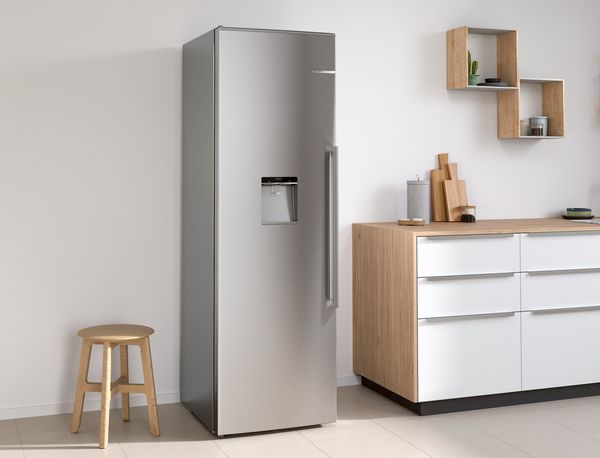
Installing your fridge
There are plenty of things to consider when installing a fridge. You may want to leave the installation to the experts from Bosch Customer Service. If you wish to install your fridge yourself, please consider the following points:
Installation location
The more refrigerant there is in an appliance, the bigger the space in which the fridge is installed must be. If the space is too small, a leak may lead to a combustible mixture of gas and air. The space must be at least 1 m³ in size for every 8 g of refrigerant. The amount of the refrigerant in your appliance is stated on the rating plate, which is inside the appliance. Depending on the model, your appliance may weigh up to 65 kg.
Condensation may appear on the exterior of the appliance if the installation area is too humid or in humid weather such as a rainy day. You may wish to wipe off any condensation with a dry towel. You may also try using your home's AC to control the humidity level in the installation area.
Permissible room temperature
The permissible room temperature depends on the climate class of the appliance. Information regarding the climate class can be found on the rating plate. The appliance is fully functional within the permissible room temperature. If an appliance of the SN climate class is operated at a lower room temperature, then temperatures as low as +5°C should not cause damage to the appliance.
Before first use
Retrieve the information material before installing the fridge and remove the adhesive tape and protective film. Clean the appliance.
Electrical connection
Do not connect your fridge to an electronic energy-saving plug, but rather to a line-commutated or sine-wave commutated inverter. Line-commutated inverters are used in photovoltaic systems with direct connection to the public power grid. For insulated solutions, a sine wave-commutated inverter must be used. Insulated solutions, e.g. on ships or in mountain huts, have no direct connection to the public power grid.
1. Wait at least one hour after installing the appliance to avoid damaging the compressor.
2. Connect the appliance to a properly installed wall socket. The socket must comply with the following ratings:
Socket 220 V – 240 V
Grounding 50 Hz
Fuse 10 A – 16 A
Outside of Europe: check whether the specified type of current for the appliance is compatible with the values of your power supply. The appliance details are given on the rating plate.
3. Connect the appliance to a socket near the device. The socket must remain freely accessible even after the appliance is installed.
The fridge installation is finished.



